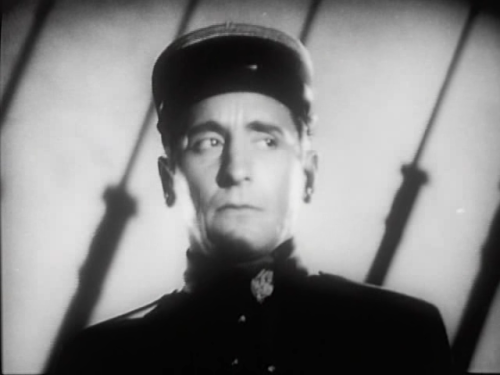Consider this one my contribution to the get-David-Cairns-to-do-a-Dieterle-Week fund:

In 1933, as it must to all directors (well, maybe not all), the Foreign Legion film came to William Dieterle. Like Six Hours To Live, The Devil’s in Love was made at Fox, rather than at the director’s 1930s home studio, Warner Brothers, where, I must agree with Andrew Sarris, he sometimes came across as a second-string Michael Curtiz (although, even during that period, he did manage to slip in a few wonderfully distinctive pieces-i.e. The Last Flight, Jewel Robbery, Scarlet Dawn, A Midsummer Night’s Dream, The Great O’Malley, Another Dawn, Juarez … Fog Over Frisco, on the other hand, while justly celebrated for its technical bravura, does seem like ersatz Curtiz–although I’ve only seen it once… I’ll post on it when I revisit it)
Anyway–the Fox Dieterles provide about as clear a forecast of the brilliant period that stretches from The Hunchback of Notre Dame (1939) to The Turning Point (1952) as any aficionado could want! Devil, in fact, plays like a trial run for 1937’s Another Dawn–a pretty amazing snatch of “orientalist” romance starring Kay Francis and Errol Flynn (among other things, the two films share a no-win love triangle between three very likable characters, a European imperialist millieu AND Herbert Mundin in pretty much exactly the same role–scoundrel/affectionate sidekick).
The story is completely wack, but it is perfectly concocted to liberate the director’s expressionistic genie. To wit: have you ever seen an image that more perfectly evokes a court-martial death sentence than the above shot?
Forget “love”–Victor Jory is in trouble! Framed for murder by one of J. Carrol Naish’s patented weakling/bastards (although a much more sympathetic specimen of the type than he often played):

As always in a Dieterle film, arbitrary authority is the only “evil.” In this case, the real devil of the piece (although he shows no signs of being in love) is a sadistic base commander who treats his servant (Naish) so badly that you are cheering for the guy, until you realize that the craven fellow plans to exact his revenge by pinning the justifiable homicide upon the outpost’s resident humanist, doctor Victor Jory–who is basically the liberal saint of Dieterle’s Muni/Kay Francis (as Florence Nightingale)/Robinson biopic cycle, transplanted from the history books into the more wonderfully manured garden of melodrama.
All of this happens within a few minutes of the title credits! Before you’re two sips into your coffee (you all drink coffee with your avi files, don’t you?), prosecutor Bela Lugosi is bearing down upon our noble protagonist with the irrefutable evidence that the doctor and the sadistic major were sworn enemies (with diametrically opposed views of the West’s proper role in Africa).

Luckily, Jory’s best friend, played by apparent Dieterle favourite David Manners (who has been steadily rising in my estimation for years–to the point where I actually love his jokey scenes with the amazing Helen Chandler in Browning’s Dracula) is a captain who knows when to subvert military discipline, and he quickly engineers the doctor’s escape.
After that, we get about 40 minutes of Jory hiding in plain sight in a city close to the base, where he becomes known as the “Consul of the Damned,” thanks to his untiring medical efforts on behalf of the region’s sickly underclass. Along the way, he meets two women, both of whom prove to be wonderful human beings… One of them, a fellow crusader at the local Christian mission, captures Jory’s heart (but when does he become a devil, the viewer wonders?). This comes as no surprise, since she is played by the eye-poppingly young Loretta Young.

But of course there are problems. She’s engaged. To Manners. It was inevitable. But it’s great! And, as always with Dieterle, the film doesn’t just tell you the characters are in love–it makes you believe it, and even need it. Only Borzage does this as well.
I won’t say any more, except that, of course, events do conspire to bring all of the principals into close proximity–and Jory does get pretty scarily demonic in this scene (when he confronts Naish with his suspicions about the latter’s role in the opening shenanigans):

Amazing stuff!
Bonjour les amis!
Dave
Read Full Post »
 Dear Anagramsci (and Motime) Readers:
Dear Anagramsci (and Motime) Readers:








